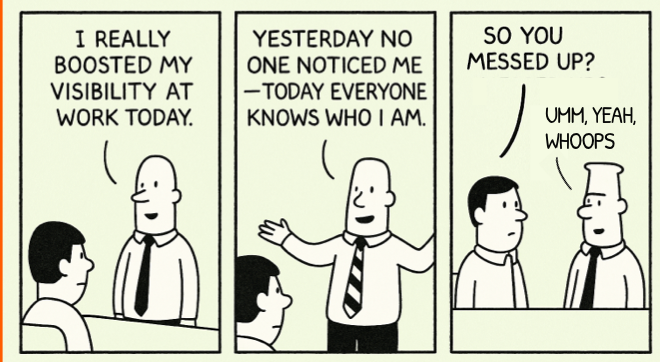So the story goes, back when the US and the USSR were racing to the moon, both sides needed a device that could write in space.
The Americans?
Spent millions inventing a pen with ink that could work in zero gravity.
Whereas the Soviets?
Just used pencils.

Now, I’ve got no idea if that’s true or not.
But, it’s something I think about when it comes to the whole “work smart vs. work hard” debate.
Sometimes working hard doesn’t cut it. And, as the story shows, sometimes when you think you’re “working smart”... you’re actually working dumb.
So, what are ambitious career types like you and I to do?
Work hard?
Work smart?
Both?
Neither?
〰 Why “efficiency” is a bad goal
At the start of my career, I was obsessed with productivity. I read all the books and implemented all the systems, but ultimately, it was a bit of a let-down.
Yeah, I was busy.
But was I actually moving the needle? No.

So now?
I don’t want to be efficient, I want to be effective.
Think about it:
You could knock out hundreds of tasks everyday, but if you’re working on the wrong tasks, then what’s the point?
Take these examples:
- Efficient: Spending all day perfecting a doc no one will read.
- Effective: Having a 10-minute chat with stakeholders to clarify project priorities (and figure out if the doc will be read!)
Or:
- Efficient: Attending every meeting you're invited to.
- Effective: Declining low-value meetings to focus on high-impact work.
Remember:
Effective people prioritize the right things, not just doing more things.
So, step one to being effective?
📝 Throw out your to-do list!
Ok..
Maybe not throw it out, but at the very least, radically change how it works.
Why?
Because while to-do lists spell out all the tasks you need to do, they don’t sort out the “junk tasks” from the truly important.
The result?
Things that are urgent & non-important tend to take over things that are very important but not urgent.

So instead…
📊 Use the 80/20 principle
Say your to-do list has ten tasks.
Chances are, two of those tasks are going to give you 80% of the results, whereas the other eight are gonna give you a paltry 20% of your results.
The logical play?
Focus on your “money” tasks by stacking your to-do list in terms of ROI (return on investment). I often call this a ‘priority’ list.

To know which tasks are your money tasks, just ask, “What’s the one task I can do today that by doing it everything else becomes easier and/or unnecessary?
Btw — what I need you to internalize is the highest ROI thing is usually NOT the thing that takes the most amount of time. e.g. something that takes 10 minutes might have more value to you than another thing that takes 20 hours! (seriously, imagine a brief check-in with a key client that prevents them from leaving versus spending weeks trying to win back lost business).
Let me give you some common examples of high-ROI tasks that don’t take long and often get overlooked:
- Spending an hour to create a template you'll use 100 times
- Taking 30 minutes to teach a colleague a skill, saving you hours of work later
- Writing a concise summary email that aligns your entire team
- Making a key introduction between two colleagues
- A quick check-in with a key client that prevents a major issue
💎 Perfect is the enemy of the done
Remember:
Each task you do (even your money tasks) follows the law of diminishing returns.
Yeah, you could spend an extra 3 hours taking your slides from 95% to 100%, but are you getting ROI on that time?
(No!)
Forget being “perfect”.
To be effective, think “good enough”.

👁️ Don’t be invisible
Ok, last thing on the 80/20 principle:
In your career, you’re going to have some highly visible projects which get you in front of key decision makers. But also, you’re gonna have some projects which no-one can see.
If you want to progress?
Try to spend as much time & energy as possible on the small number of highly visible projects.
(Even try moving teams if need be).
This happens all the time in the corporate world. Someone might be working 24/7 behind the scenes, but if their project loses funding, their hard work goes unnoticed. Meanwhile, someone on a high-profile project that just got a budget boost gets promoted, even if they're not working as hard.
Don't toil in obscurity on busywork. Make sure the right people see your wins.

Btw:
LinkedIn is great for being more visible too, especially if you’re connected with people at work. Don’t share confidential stuff on Linkedin (duh), but write and share content people in your industry might find useful and that show you know your stuff.
The first step though is optimizing your LinkedIn profile. Use this free tool to start with. (It’s Resume Worded’s tool — and is by far the best thing out there for optimizing LinkedIn profiles)
🕗 Streamline & automate
Finally…
You can’t devote yourself to the truly important if you’re wasting tons of time on repetitive busywork.
The solution:
Automate processes and build systems where possible.
Use tech to put repetitive tasks, like expense reports, meeting scheduling, reporting and the like, on autopilot. Create templates and checklists for common workflows so you're not reinventing the wheel. And if you can cut out steps, or approvals, or meetings, do it!
This is where the difference between efficiency and effectiveness really shines:
- Efficient: Doing the same 50 tasks every day, spending 10 hours to get through them all.
- Effective: Spending a week figuring out how to automate half those tasks, cutting your daily workload to 5 hours.

🎭 Spot the ‘fake work’
Corporate environments breed a particular type of inefficiency: fake work. People do them because they like appearing busy, not because it serves any real purpose.
My personal pet peeve?
When someone sends me a recurring meeting invite to sync up on a task.
I hate it. You're literally booking my calendar every week for eternity before we even know if there will be anything to discuss that week. What if nothing happens that week? Now we’re both stuck with 20 minutes of filler small talk every Tuesday at 3pm until the end of time. Even if we cancel half of them the morning of, we’re still spending mental energy every week wondering if this one will actually be useful.

Recurring meetings are classic ‘fake work’. If someone schedules a recurring meeting to check in on a task or project, by default you should always challenge it.
Decline and reply back with something like, "Do you mind if we stick to an email update instead of meeting weekly? I’ll send you a message when I hit any roadblocks or milestones, then we can schedule something if we need to.”
Other fake work offenders and solutions:
- Documentation templates nobody reads. A lot of corporate work involves filling out annoying and long templates that are never read just because it’s ‘the process’. Use ChatGPT and AI to help you fill these out.
- Useless meetings. If it's not clear what the meeting is for and there's no agenda - just decline it. If there are too many people invited - say no. So often there's really only about 1.5 people on the room who you really need.
To be really effective, you need to learn how to spot and get out of fake work to free your time.


